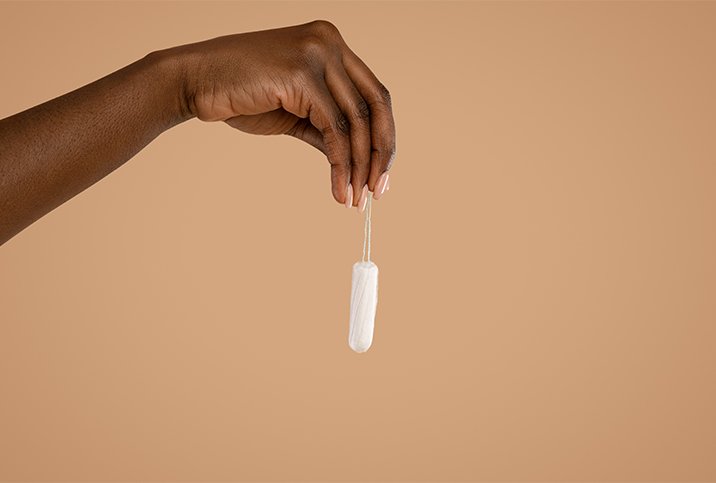Have You Been the Victim of a 'Super Soaker Event'?

The menopausal transition, which lasts for four years on average and often longer, is the slow decline of ovarian activity. While heavy menstrual bleeding or flooding is common during perimenopause, a severe episode—a "super soaker event"—with additional symptoms, such as dizziness, nausea, feeling faint or passing out, might require hospitalization.
Fluctuation in period frequency and blood volume is common during this transitional period, but these symptoms shouldn't be dismissed, according to Fiona Catchpowle, the founder of the Menopause School, an e-learning platform based in England.
"As the ovarian activity changes, so do patterns of the menstrual cycle," Catchpowle said. "The lifetime journey along the typical 'hormone highway' from periods to no periods is approximately 40 years. During the first 30 years, the infradian cycle we call menstruation is repeated approximately every 28 days."
However, regular menstruators experience a different kind of bleeding once or twice a year, called the anovulatory cycle, when the cycle has gone full circle but ovulation has not occurred, she explained.
During late perimenopause—the last few years of the menopause transition—the menstrual cycle becomes more anovulatory than ovulatory.
"The ovaries basically become noncommittal or inconsistent and prefer not to take part in the cycle in the way they used to. As such, the pattern of the bleed time frame becomes even more different, and many menstruators experience very heavy bleeding," Catchpowle explained.
At the beginning of the menopausal transition, women may notice their cycles are getting closer together. Near the final menstrual period, they are more spaced out, said Deborah Lee, M.B.Ch.B., a sexual and reproductive health specialist at Dr Fox, an online pharmacy in the United Kingdom.
What is heavy bleeding?
Average blood loss is generally up to 80 milliliters (ml) during a normal period and 133 ml or more during the run-up to menopause. More than 200 ml is considered heavy bleeding, which is uncommon.
"Flooding is often defined as bleeding with clots greater than 1 inch in diameter, needing to change tampons or pads more than once an hour, and a low serum ferritin [iron deficiency]," Lee explained. "Experts believe that a fully soaked pad contains 5 ml of blood, so if you use more than 16 pads per period, you can probably assume [your] periods are heavy."
Factors associated with heavy menstrual bleeding include ethnicity, body mass index (BMI), medical conditions such as type 2 diabetes and thyroid issues, bleeding disorders, anticoagulants and gynecological conditions.
The cycle of Asian women tends to last around two days longer than that of white women, and women of color tend to start their menopause earlier than white women, according to Lee.
BMI is a measure of body fat based on height and weight. Being above or below the average BMI can also affect the menstrual cycle. Lee said a low BMI tends to cause an increased number of bleeding days, while a high BMI tends to shorten bleeding duration but is more likely to be associated with a heavy flow.
Gynecological conditions linked to heavy menstrual bleeding include:
- Fibroids
- Adenomyosis
- Polyps
- Endometrial hyperplasia
- Polycystic ovary syndrome (PCOS)
Treating heavy menstrual bleeding
There are effective remedies to reduce the risk of super soaker events during the menopausal transition. Unless someone's flow is so heavy that they're unstable, first-line therapy typically is medical management, explained Kathleen Jordan, M.D., a physician in San Francisco and the chief medical officer at Midi Health, a virtual clinic for middle-aged women.
The medical evaluation normally includes a biopsy for women who are older than 40 or at risk for endometrial hyperplasia. Risk factors for endometrial hyperplasia include obesity, smoking, never having been pregnant, certain medical conditions and a family history of cancer, according to the American College of Obstetricians and Gynecologists.
"As long as these tests show nothing suggesting an anatomic cause that should be treated, like removal of a fibroid or polyp or possible cancer, medical management is considered," Jordan said. "This would typically be oral contraceptive pills or cyclic progesterone or often off-label use of a Mirena IUD, which is a very effective way to manage heavy or irregular bleeding up to menopause."
Abnormal bleeding for postmenopausal women comes with different concerns.
"For postmenopausal women with bleeding, the first approach is to rule out cancer with either an endometrial biopsy or an ultrasound that looks at the endometrial lining," Jordan said.
Whether you're experiencing heavy bleeding or other symptoms as your body transitions into menopause, remember you're not alone. There are treatments available and the discomfort will ease with time, so talk to your doctor about the solutions that are right for you.


















